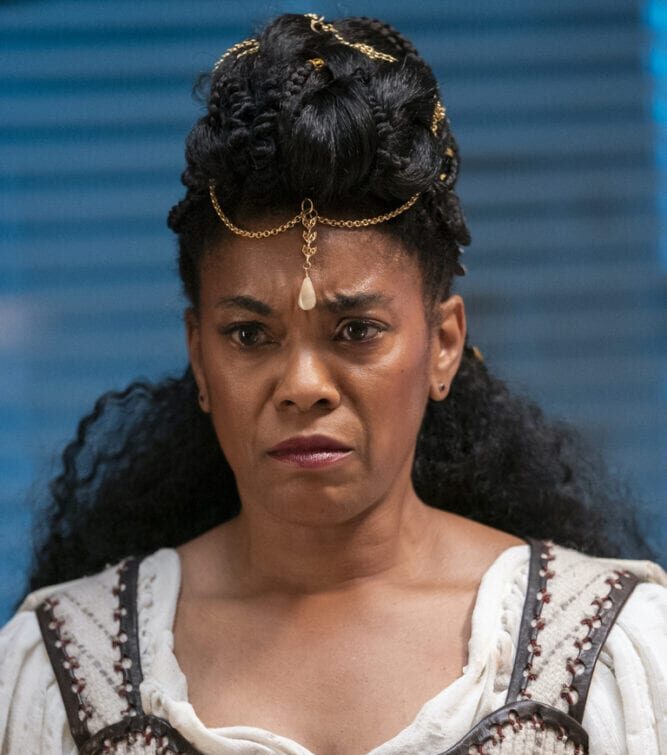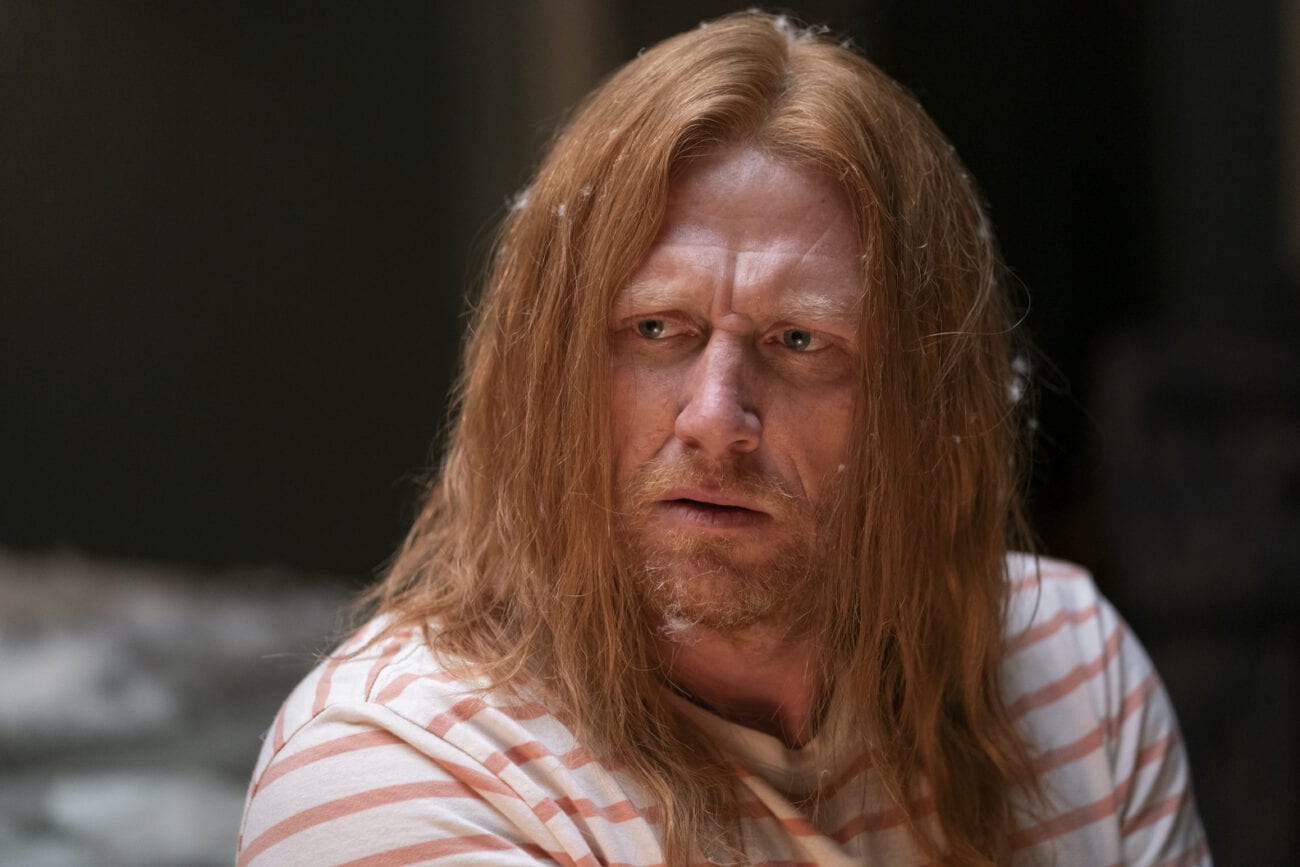If you’ve just finished Room 104 S4E9 “The Last Man” (directed by Julian Wass and written by Mark Duplass) you may find yourself wondering what in the hell you just watched. It’s a strange episode, experimental even by the standards of this show, and I honestly found myself wondering how many people might have turned it off within the first few minutes. All I can say is that if you are one of them I encourage you to go back to watch the rest.
And then watch it again.
I have to admit that the first time I was a bit bewildered, as S4E9 opens with a shot of the door to Room 104 that seems to open onto a desert landscape, and then kicks right into Kyran (Kevin McKidd) singing about his desire to be the first man…for several minutes. But the second time through I was belly-laughing, and that laughter continued through the rest of “The Last Man.”
There is a significant shift of tone about 11 minutes in, it is true—significant enough that it almost feels like S4E9 changes genre. But I think it is more appropriately viewed as a story in three acts. The first introduces us to Kyran and his millennia old battle with Durkon (Desean Terry), along with his mentorship by Granada (Suzanne Nichols). The second presents the crisis of our hero’s soul, as he questions the meaning of his existence and considers radiator-assisted suicide in Room 104. And then the third provides the resolution of the story, through the ultimate showdown between Kyran and Durkon, and their reconciliation.
It is a fairly traditional story structure, but that doesn’t keep “The Last Man” from feeling pretty bananas. The tone is reminiscent of a certain kind of fantasy that (for whatever reason) seemed to have something of a heyday in the 1990s. I’m thinking of shows like Xena, Hercules, Highlander, and also of certain films I find myself unable to name. But much as with the way “Oh, Harry!” presented ‘90s sitcom tropes in a manner that transcended any particular example and the “Conformity” song in “Foam Party” did the same when it comes to ‘90s pop-punk, Room 104 S4E9 gives the quintessence of a particular kind of genre television.
The lines are overblown and the action is ridiculous. Quick cuts occur as though they care more about startling the viewer than making any sense. Dialogue drips with cliché, and we even get a training montage that it is hard to believe would improve anyone’s skill, overlaid with platitude that pretends to be wisdom.
It’s great.

Of course “The Last Man” is a musical episode (much like “Arnold,” which was also directed by Julian Wass), and I will have more to say about the songs that form its core presently, but I first want to note the power of the incidental music that Wass uses to score the scenes where singing is absent. The training montage, in particular, is set to the perfect kind of minimalistic flute music to remind us of scenes like this we have seen before. You almost think you know the song from elsewhere.
132,478 Years Later…
If you’re looking for an explanation of Room 104 S4E9 I think it is readily available. We learn, as events come to a head at the end of the episode, that Durkon and Kyran are actually brothers, and Granada is their mother. We get the training montage again in condensed form, shifting between the two characters who have come to be mortal enemies, before they realize that what they really need to do is turn toward each other to bring their swords together, producing a flash of light.
But it is what we see immediately afterwards—the very last scene of “The Last Man”—that provides explanation if that’s what you are after. A young Durkon (Michael Ray Taylor) and a young Kyran (Zakary Risinger) fight with toy swords as their mother looks on in Room 104. And as we have already learned that somehow all of the battles over the ages between the two occurred in this same space, it is easy enough to retroactively interpret the episode as displaying the fantasy play of the two young boys.
After all, the elements of world-building on display in S4E9 are precisely the kind of absurdly overblown things that young boys will come up with, from the feud cutting across epochs of time, to the twist that Granada is actually their mother but could not tell them for…reasons. You have to just accept it.
Nonetheless, reducing “The Last Man” to the fantasy of two boys playing in Room 104 risks missing the point, which is about play itself. The First Man would “finally learn the way the children were meant to play,” or so the song tells us. The real goal is to break away from the strife and hatred that has defined all of these long seasons of war—across millennia of time.
This is the tragedy of Kyran and Durkon: they get so caught up in their antagonism that they forget that they are brothers who fundamentally share a goal. Should it matter who is the first man to ferry goodness over the wall? Could they not do it, perhaps…together?
Thus beyond the kitsch of S4E9 there is a real message to be found, as is often the case when it comes to genre TV. Human beings have been fighting for reasons they cannot remember for thousands of years, hoping that they can somehow bring about a lasting peace, but getting caught up in the idea of being the one to do it by triumphing over the forces of evil, when the only real way would be by remembering that we are familial offspring of one creation—to turn towards each other to bring out the light between us.
“Darkness cannot drive out darkness; only light can do that. Hate cannot drive out hate; only love can do that,” as Martin Luther King Jr. may or may not have precisely said.
The Last Man

But there is another important aspect of Room 104 S4E9, which relates to its title—“The Last Man”—and comes to the fore in its second act. Kyran finds himself thrown into Room 104 as it exists in the 1990s (I think, based on the cable TV reference), where a family is playing Monopoly. The father is drinking wine, which Kyran takes from him before lounging to watch the aforementioned cable TV. Then he bursts into a song about how all of the extraordinary things he has seen mean absolutely nothing, in the midst of which his clothing changes from medieval garb to a striped shirt and loose-fitting shorts.
Alas, the time is coming when man will no longer give birth to a star. Alas, the time of the most despicable man is coming, he that is no longer able to despise himself. Behold, I show you the last man.
‘What is love? What is creation? What is longing? What is a star?’ thus asks the last man, and blinks.
The earth has become small, and on it hops the last man, who makes everything small. His race is as ineradicable as the flea; the last man lives longest.
‘We have invented happiness,’ say the last men, and they blink.” – Friedrich Nietzsche, Thus Spoke Zarathustra, 5
Kyran laments the lack of meaningfulness to be found in creature comforts, curios like an alien butt-plug, and cable TV. The last man consumes rather than creates. He has won but is despicable like the winner of the reality show Kyran mocks. What meaning is there when there is no fight left?
His seemingly eternal struggle with Durkon formed a proper agon—the conflict spurring each to better themselves. Without this Kyran is listless, but not quite a Nietzschean last man. He seems to retain the ability to despise himself. He knows what he is missing, but gives up hope of finding it as he sets up his sword on the radiator of Room 104, preparing to impale himself.
But then Durkon appears and stops him. They rediscover the importance of their contest. It isn’t in winning, but in the struggle itself. And perhaps if they turn towards each other, this time they might get it right and ferry goodness over the wall. Never mind the fact they’ve impaled each other and really should probably be dead by the time they do that.
The agon is itself a form of play, in contrast to something like a brute struggle for survival. The joy is in the competition, which forms a game even if the stakes are a matter of life and death. We forget this, we “last men” in this age of consumerism. We have invented happiness: smartphones, gadgets and commodities galore. And we blink.
This is just life, with no real goal, or sense of purpose. But what Zarathustra impels us towards is not to instead suffer for the sake of something like career success. He asks us to dance, to play, to find the meaning that stems from this very creativity. It is not about power over others, but expressing the power of oneself and what one is capable of.
The ideal game is not like Monopoly, with its strictly defined rules that provide parameters for the play. It is a game where the rules themselves are a part of the game. That is, the rules are also at play, and to be played with. The ideal game creates its own rules as it goes along, only to potentially undo them or transform them halfway through.
In this way Room 104 S4E9 itself exemplifies the message of its content through its own form. What I wouldn’t give to have been there when Julian Wass, Mark Duplass, and others made this episode—to watch them play.


The kids sword fighting at the end definitely depicts the episode in a different light. It reminded me a bit of the revelation at the end of the Dave Bautista episode (‘Avalanche’). While I was watching it though, I had different interpretation. Once they realize that they’re brothers, they stop fighting. Somehow (maybe because of all the events going on in the world), I saw this as an allegory or parable for racism. They both shared the same mother (a creator figure, or God) but they seemed to forget that because they only saw the differences of their skin color and were vying to be the “Last Man.” I have to believe there’s a reason they are both black and white. I don’t know if this was an intention of the writing, but it affected me greatly.